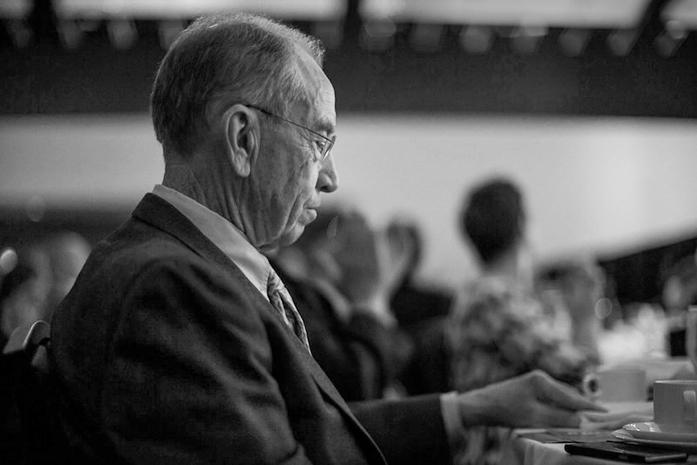Washington, D.C — Sen. Chuck Grassley’s days are a mixture of his Iowa roots and the national spotlight that has shone upon him a little brighter since former Supreme Court Justice Antonin Scalia’s unexpected death.
Grassley, who chairs the Senate Judiciary Committee, has refused to hold hearings for Merrick Garland, the chief judge on the D.C. Court of Appeals whom President Obama named as the nominee to replace Scalia. This decision has been met with unyielding criticism, with some politicians even referring to Grassley as the “most obstructionist Judiciary chairman” in history.
But Iowans themselves and political scientists are unsure whether this national backlash will harm Grassley, who is up for re-election this fall, in his home state where he is revered.
- • •
The normally punctual Grassley arrived to a meet-and-greet with Iowa’s delegation in a corner room of the Cannon House Office Building. He took a chocolate crème-filled doughnut and a cup of coffee with two single-serve cups of heavy cream with loyal staffers at hand. He exchanged pleasantries before being ushered out.
Capitol Hill, on a surface level, was very respectful. No one greeted Grassley with less than a “Good morning, Senator.” Reporters tagging along were not questioned by security or in the senators-only elevator.
There were no mentions anywhere of obstructionism or of “Doing your job.” At least, not that morning and not to Grassley’s face.
He devoted part of his morning to answering questions from Iowa press. That particular day was declared “AgDay,” a yearly celebration of America’s agriculture. Grassley took calls while sitting in the Senate’s radio booths. Prior to answering questions, he asked his staff about the University of Northern Iowa’s women’s basketball team. It didn’t make it to the NCAA Tournament, and it caught Grassley off-guard. (His schedulers often cross-check his schedule when visiting Iowa with UNI’s athletic schedules.)
While Grassley sat close to a microphone, various midsized to small newspapers and radio stations called in. Grassley read from a script praising Iowa’s agriculture, and he gave every station a chance to ask a question.
To no one’s surprise, there wasn’t a single question about agriculture.
The reporters asked about Apple, security, and the Supreme Court vacancy, instead.
He’s simultaneously an Iowan, plucked from the Midwestern state, and, for some, the figurehead of deeply divided political system.
He’s well-known for the “Full-Grassley,” the name of the 99-county tour he does every year. It’s something that has given him almost universal name recognition in the state.
“I would be surprised if there are many Iowans who haven’t met Grassley … if they’ve wanted to,” said Christopher Larimer, an associate professor of political science at the University of Northern Iowan. “I would be surprised if there were any members of Congress who had more of a connection [with their constituents] than he is.”
Larimer said while Iowans aren’t disconnected from the Supreme Court nomination process, it likely isn’t a top priority and takes a back seat to the economy and national security.
A March 4 Des Moines Register/Mediacom Poll shows Grassley’s approval rating at 57 percent, which is down 7 percentage points from one year ago. Only 28 percent disapproved of Grassley. The poll, which surveyed 804 Iowans, has a margin of error of plus or minus 3.5 percentage points.
After Grassley’s radio interviews, he left for a Senate Judiciary Committee hearing on late-term abortion but quickly handed the reins over to South Carolina Sen. Lindsey Graham. He then attended a policy lunch and followed it up with a reception for Iowans, cohosted by Sen. Joni Ernst, R-Iowa. There, he stood for pictures and chatted with young Iowans.
Again, there were no questions of his decisions. Instead, the Iowans in attendance maintained that Grassley has always done what was in the best interest of Iowans. Tony Louwagie, one of those in attendance, has been a lifelong supporter of Grassley for his loyalty to agriculture.
It’s the theme apparent in Iowa, even if not in Washington, D.C.
The next day, on the steps of the Supreme Court, Democrats such as Sen. Elizabeth Warren, D-Mass., and Sen. Chuck Schumer, D-N.Y., demanded the Senate Republicans “do their job” and hold hearings for Garland.
But Grassley’s re-election might be contingent on that thing he does so well — and that is connect with Iowans while in the Hawkeye State.
“He’s been in powerful positions for a long time, but he’s someone who is very relatable. That is part of his persona,” Larimer said. “That is what makes him unique even when he wields a lot of political power, even now — Iowan’s still feel very connected to him.”
During the reception, Grassley’s wife, Barbara, made her way around the room, laughing and talking politics. She wore a broach of the U.S. Capitol with a glitter dome and insisted she knows how to traverse the security better than her husband. She talked about how she stumps for Iowa Republicans campaigning for seats in the Iowa Legislature.
“I will campaign for you even if you don’t have a prayer because I am so appreciative that you’re willing to put your name on the ballot,” she said.
After the reception, Grassley returned to his office. Like many days, he had eight 15-minute appointments with Iowans to talk about their concerns.



